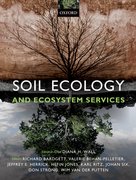Ecosystem Services
The many species and hence the biodiversity on our planet, including humans, interact with one another in many ways. These interactions among and between species are what define ecosystems. Ecosystems in turn, provide many "services" from which humans benefit. Ecosystem services are the transformation of a set of natural assets (soil, plants and animals, air and water) into things that we value as humans. In the Millennium Ecosystem Assessment report (2005) ecosystem services were described to interact with human well-being and direct and indirect drivers according to the figure. In short ecosystem services are the services provided by the ecosystems to support human well-being.

Soils are crucial for food production, nutrient cycling, and the supply and purification of drinking water. The living components of soils play an essential role in these life support functions as they enable soils to maintain their ecological integrity by recycling nutrients (ecological insurance function), inactivating contaminants (self-purifying function), suppressing pathogens (disease suppression function), and serving as a suitable substrate for plant growth. Although the importance of these soil ecosystem functions has been widely recognised, the underlying biological and molecular processes are still poorly understood. Traditional approaches to unravel these functions are limited in their capacity and for the vast majority of soil microorganisms no knowledge exists.
The economically profitable use of soil agro-ecosystems requires the input of large amounts of chemicals to optimise production capacities of soils and to control plant diseases. There is a strong societal awareness and drive toward the development of sustainable production systems that are less dependent on chemical fertilisers and pesticides. Hence, there is an urgent need to stimulate the development of healthy soils, i.e. soils that contain active and diverse microbial communities with optimal levels of decomposers, nitrogen fixers, mycorrhizal fungi, and microorganisms that degrade pollutants, provide nutrients for plants and suppress soil-borne pathogens. Thus, an in-depth understanding of soil biodiversity is a key to ensuring a sustainable use of soil.
Biodiversity is among the providers of ecosystem services and as such the links between soil biodiversity, soil functions and soil ecosystem services are very important to study. Essential environmental services delivered by soils include: nutrient cycling, carbon storage and turnover, water retention, regulation of soil structure, resistance to pests and diseases, regulation of above ground diversity. These services result from the functioning of and interactions between living soil organisms (i.e. microbes, fauna and plant roots). Therefore, the aim of EcoFINDERS is to determine the role that biodiversity plays in soil functioning, climate feedbacks and ecosystem services delivery.
Read more in EcoFINDERS publications:
Biogeography and phylogenetic community structure of soil invertebrate ecosystem engineers, Global to Local Patterns, Implications for Ecosystem, Functioning and Services and Global, Environmental Change Impacts
Brussaard, L.; Aanen, D.K.; Briones, M.J.I.; Decaëns, T.; Deyn, G.B. de; Fayle, T.M.; James, S.W.; Nobre, T. (2012).
Ecosystem services provided by the soil biota
Brussaard L. 2012.
Both in Soil Ecology Ecosystems Services
Editors: Diana H. Wall, Richard D. Bardgett, Valerie Behan-Pelletier, Jeffrey E. Herrick, T. Hefin Jones,Karl Ritz, Johan Six, Donald R. Strong, and Wim H. van der Putten,
Oxford University Press, 45-58 and p. 201 - 232
Find book here

- Novel, research level book linking soil ecology with the contemporary paradigm of ecosystems services
- Emphasizes the integrative biodiversity of soils, adopting an ecosystem approach
- Consolidates the discipline within an ecosystem services framework, providing a series of models for further research
This multi-contributor, international volume synthesizes contributions from the world's leading soil scientists and ecologists, describing cutting-edge research that provides a basis for the maintenance of soil health and sustainability. The book covers these advances from a unique perspective of examining the ecosystem services produced by soil biota across different scales - from biotic interactions at microscales to communities functioning at regional and global scales. The book leads the user towards an understanding of how the sustainability of soils, biodiversity, and ecosystem services can be maintained and how humans, other animals, and ecosystems are dependent on living soils and ecosystem services.
Readership: A valuable reference book for academic libraries and professional ecologists worldwide as a statement of progress in the broad field of soil ecology. It will also be of interest to both upper level undergraduate and graduate students taking courses in soil ecology, as well as academic researchers and professionals in the field requiring an authoritative, balanced, and up-to-date overview of this fast expanding topic.
In EcoFINDERS the focus is on the following ecosystem services
- Carbon storage and nutrient turnover
- Nutrient cycling in soilCarbon storage and turnover
- Water and soil structure regulation
- Resistance to diseases and pests
- Regulation of above-ground biodiversity
- Resistance and resilience of soil communities
Reference:
Millennium Ecosystem Assessment (MA). 2005. Ecosystems and human well-being: Synthesis. Island Press, Washington DC.